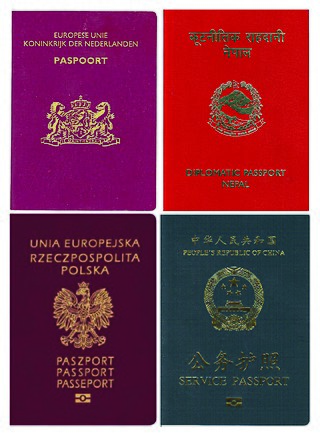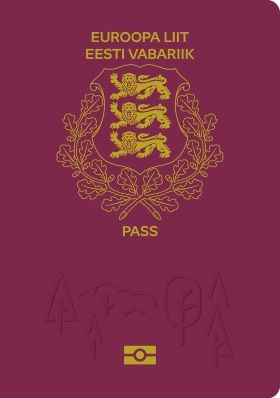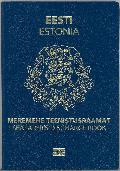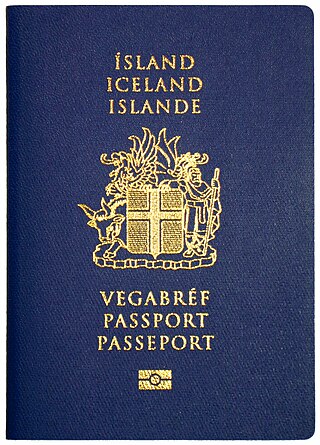
A passport is an official travel document issued by a government that contains a person's identity for international travel. A person with a passport can travel to and from foreign countries more easily and access consular assistance. A passport certifies the personal identity and nationality of its holder. It is typical for passports to contain the full name, photograph, place and date of birth, signature, and the expiration date of the passport. While passports are typically issued by national governments, certain subnational governments are authorised to issue passports to citizens residing within their borders.
An identity document is any document that may be used to prove a person's identity. If issued in a small, standard credit card size form, it is usually called an identity card, or passport card. Some countries issue formal identity documents, as national identification cards that may be compulsory or non-compulsory, while others may require identity verification using regional identification or informal documents. When the identity document incorporates a person's photograph, it may be called photo ID.

A certificate of identity, sometimes called an alien's passport, is a travel document issued by a country to non-citizens residing within their borders who are stateless persons or otherwise unable to obtain a passport from their state of nationality. Some states also issue certificates of identity to their own citizens as a form of emergency passport or otherwise in lieu of a passport. The visa requirements of certificates of identity may be different from those of regular passports.

The World Passport is a fantasy travel document sold by the World Service Authority, a non-profit organization founded by Garry Davis in 1954.

A travel document is an identity document issued by a government or international entity pursuant to international agreements to enable individuals to clear border control measures. Travel documents usually assure other governments that the bearer may return to the issuing country, and are often issued in booklet form to allow other governments to place visas as well as entry and exit stamps into them.

A refugee travel document is a travel document issued to a refugee by the state in which they normally reside in allowing them to travel outside that state and to return there. Refugees are unlikely to be able to obtain passports from their state of nationality and therefore need travel documents so that they might engage in international travel.

An Estonian passport is an international travel document issued to citizens of Estonia, and may also serve as proof of Estonian citizenship. Besides enabling the bearer to travel internationally and serving as indication of Estonian citizenship, the passport facilitates the process of securing assistance from Estonian consular officials abroad or other European Union member states in case an Estonian consular is absent, if needed. If an Estonian citizen wishes to receive an identity document, especially an Estonian passport, somewhere other than the foreign representation of the Republic of Estonia, then the bearer of the Estonian citizenship staying abroad could receive the travel documents in embassies of any EU country worldwide by paying 50 Euro. Many countries require passport validity of no less than 6 months and one or two blank pages.

Lithuanian passport is an official document, issued to Lithuanian citizens to identify themselves as such and/or to facilitate travel outside Lithuania. Every Lithuanian citizen is also a citizen of the European Union. The Lithuanian passport, along with the national identity card allows for free rights of movement and residence in any of the states of the European Union, European Economic Area and Switzerland.

The European Union itself does not issue ordinary passports, but ordinary passport booklets issued by its 27 member states share a common format. This common format features a coloured cover emblazoned—in the official language(s) of the issuing country —with the title "European Union", followed by the name(s) of the member state, the heraldic "Arms" of the State concerned, the word "PASSPORT", together with the biometric passport symbol at the bottom centre of the front cover.

The Swedish national identity card is a non-compulsory biometric identity document issued in Sweden. It is one of two official identity documents issued by the Swedish Police, the other being the Swedish passport. It is only issued to Swedish citizens, and indicates the citizenship.

The Estonian identity card is a mandatory identity document for citizens of Estonia. In addition to regular identification of a person, an ID-card can also be used for establishing one's identity in electronic environment and for giving one's digital signature. Within Europe as well as French overseas territories, Georgia and Tunisia the Estonian ID Card can be used by the citizens of Estonia as a travel document.

The Burundian passport is issued to citizens of Burundi for international travel.

An Estonian Alien's Passport is a travel document that may be issued to a person who is stateless or of undefined citizenship residing in Estonia by the Police and Border Guard Board of the Ministry of Internal Affairs. It can also be used as an identity document. Estonia has about 80,000 to 90,000 alien's passports.

The Citizenship and Migration Board (CMB) was a government agency in Estonia under the Ministry of Internal Affairs that was in charge of enforcing regulations concerning immigration and nationality. In 2010, it was merged with other agencies and formed Police and Border Guard Board.

An Estonian temporary travel document is a travel document issued to an alien staying in Estonia for departure from and return to Estonia. A temporary travel document may be issued, without a standard application, to an alien who departs or is obliged to depart from Estonia without the right of return if he or she does not hold a valid travel document or a certificate of return issued by a foreign state. A temporary travel document for a single departure from and return to Estonia may be issued to an alien legally residing in Estonia if he or she does not hold a valid travel document and does not have the right to receive an alien’s passport. A temporary travel document does not grant the holder thereof the right to protection by a foreign mission of Estonia unless otherwise provided by law or a treaty. A temporary travel document shall be issued with a period of validity of up to two years.

An Estonian seafarer's discharge book is an identity document issued by Estonian Police and Border Guard Board in which the name, date of birth or personal identification code, and a photograph or facial image and the signature or image of signature of the holder are entered, unless otherwise provided by law or legislation established on the basis thereof. A seafarer who is an Estonian citizen shall be issued a seafarer’s discharge book which complies with the requirements of the “Convention concerning Seafarers’ National Identity Documents” of the International Labour Organisation (ILO). A seafarer’s discharge book shall be issued with a period of validity of up to five years.

The Police and Border Guard Board, a government agency under the Ministry of Internal Affairs in Estonia, issues a variety of travel documents to Estonian nationals and other foreign nationals living in Estonia to facilitate travel outside of Estonia.

The Japan Re-entry Permit (再入国許可書), is a travel document similar to a certificate of identity, issued by Japan's Ministry of Justice. It is a passport-like booklet with a light brown cover with the words "再入国許可書 RE-ENTRY PERMIT TO JAPAN" on the front.

Passports of the EFTA member states are passports issued by the European Free Trade Association (EFTA) member states Iceland, Liechtenstein, Norway and Switzerland. EFTA is in this article used as a common name for these countries.
The British Certificate of Travel is an international travel document and a type of Home Office travel document issued by the UK Home Office to non-citizen residents of United Kingdom who are unable to obtain a national passport or other conventional travel documents. Until 17 March 2008, the Certificate of Travel was called a Certificate of Identity. It is usually valid for five years, or if the holder only has temporary permission to stay in the United Kingdom, the validity will be identical to the length of stay permitted.



















